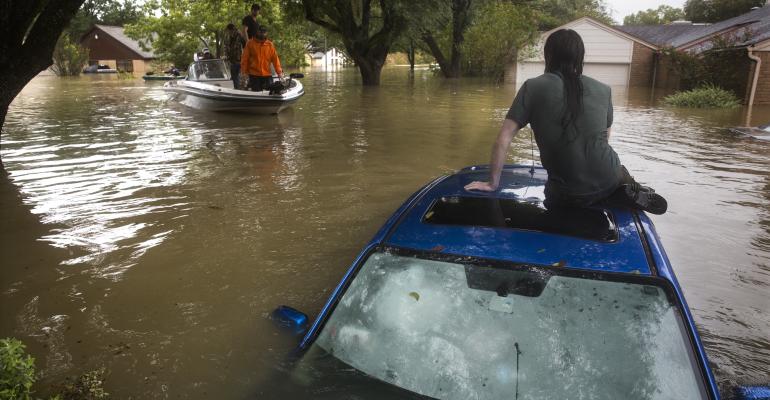(Bloomberg)—A year to the day after Hurricane Harvey ravaged the Gulf Coast of Texas, residents there head to the polls to decide a $2.5 billion bond referendum for critical flood control projects in an area that the Category 4 storm plunged underwater.
Harris County officials purposely chose Saturday’s anniversary for the election, seeking to bring out voters and quickly cash in on matching federal funds. Proceeds from the bond, if approved, would finance about 237 projects, including repairs to flood-damaged drainage infrastructure, buyouts of flood-prone properties and channel modifications to improve the flow of storm water. It’s the largest bond measure in the county’s history.
The vote comes as coastal cities around the country are facing the threat of catastrophic infrastructure damage from storms exasperated by climate change. Last year, the U.S. was hit by three major storms that virtually destroyed Puerto Rico’s electric grid, flooded Texas with record rains and ripped into Florida, sending the sea into the streets of Miami. The number of deaths is still uncertain and the storms racked up losses totaling more than $200 billion, the most ever.
For Houston Mayor Sylvester Turner, the vote is one of the most important decisions residents there will make. "We can’t afford to wait any longer. We cannot afford to get this one wrong," he said during a press conference earlier this month.
A poll by the University of Houston found that 55 percent of residents support the bond referendum even though it would result in a 1.4 percent property-tax increase for the average homeowner in Harris County, the nation’s third most populous. Just 10 percent of those surveyed said they would vote against it, while a third were undecided.
Before Harvey, the Houston area had never experienced flooding of the magnitude caused by the storm as it lingered over land for four days, dropping record rainfall. Even experts were unprepared. The National Weather Service had to add two colors to its graphics when mapping the storm movement because of the unprecedented amount of rain.
The National Oceanic and Atmospheric Administration estimates Harvey caused $125 billion in damages, making it the second costliest storm in recorded U.S. history behind the $161 billion in damages inflicted by 2005’s Hurricane Katrina, according to Moody’s Investors Service.
“It will not accomplish everything we need to accomplish. We need to recognize that,” Judge Ed Emmett, head of the county commissioners court, the governing board for Harris County, said during a meeting in June prior to placing the measure on the ballot.
The storm was too much for the Harris County Flood Control District and its $120 million annual budget. “We just have a lot of ground to cover, a lot of infrastructure to maintain and a lot of problems to solve and $120 million doesn’t go that far,” said the district’s director of operations Matthew Zeve.
Taking Action
Harris County isn’t alone in asking voters to back bond sales to cope with climate change.
In 2012, Seattle voters overwhelmingly approved a $290 million debt measure to rebuild the Elliott Bay seawall that protects the downtown waterfront. In the San Francisco Bay area, residents approved a tax to fund a $500 million restoration of tidal marshes, which act as a buffer against storm surges. Following Hurricane Irma last year, Miami voters approved $400 million in bonds to finance projects to protect the city against the impact of global warming.
The Union of Concerned Scientists found that sea level rise, driven primarily by climate change, puts hundreds of thousands of homes and commercial properties in the U.S. at risk of being flooded at least 26 times per year by 2030. The incessant deluges would depreciate property values, erode infrastructure and eventually diminish tax revenue, causing local credit ratings to sour and making it more difficult to finance projects needed to contend with rising sea levels.
“The more that we wait the worse the effects of climate change will be,” said AllianceBernstein LP’s Eric Glass, who manages the firm’s $365 million municipal-impact portfolio. “And the bigger investment in climate change we will have to make.”
--With assistance from Sophie Alexander, Brian K. Sullivan and Joe Carroll.To contact the reporter on this story: Danielle Moran in New York at [email protected] To contact the editors responsible for this story: James Crombie at [email protected] Michael B. Marois, William Selway
© 2018 Bloomberg L.P

